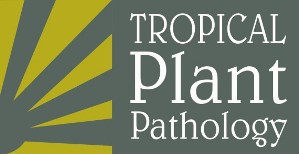This study aimed to determine the potencial of jasmonic acid (JA), deacetylated chitosan (DC), potassium silicate (PS), Acibenzolar-S-Methyl (ASM), ethephon (ET), and potassium phosphate (PP) on the reduction of blast severity on wheat. The fungicide tebuconazole (TE) and distilled water (DA) were used as control treatments. Plants from the cultivars BR 23, BH 1146, and BRS 208 were sprayed with JA, DC, PS, ASM, ET, PP, TE, and DA 24 h before inoculation with Pyricularia grisea. The incubation period (IP), blast severity, and the effect of the treatments on mycelial growth of P. grisea were evaluated. For the IP, there was no significant difference among cultivars and also for the treatments, but there was interaction between these factors for severity. The lowest severity for BR 23 cultivar occurred with the spray of TE, PP, and ET, which were not significantly different among them. For BH 1146 cultivar, the treatments DA, DC, and ASM were not significantly different among them, but differed significantly from the other treatments to which were obtained the lowest severity. The spray of TE and PP gave the best reduction on severity for BRS 208 cultivar. The PP was the treatment that most reduced severity on the three cultivars tested. The lowest values for mycelial growth of P. grisea occurred upon the addition of TE and PS to the culture medium. The results of this study point to the promising effect of PP and ET in the potentiation of wheat resistance to blast disease, which showed to be dependent on the basal level of resistance of the cultivar.
Pyricularia grisea; Triticum aestivum; induced resistance


